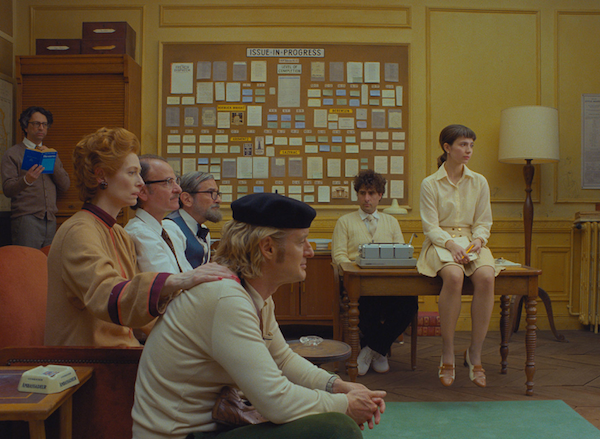Movie review by Greg Carlson
First, a note to the naysayers and cynics and grumps and sourpusses and killjoys who would dismiss Wes Anderson as a suffocating ironist infatuated with his dollhouse miniatures and his own cookie cutter formulae recycling the same set of actors within his symmetrically composed frames: GET LOST, GO AWAY, SHOVE OFF. “The French Dispatch of the Liberty, Kansas Evening Sun” is not for you. But for those who have maintained punctuality and perfect attendance, those who have ever substituted a Tic Tac for prescription stomach cancer medication, those who keep dues paid-up in the Society of the Crossed Keys, you don’t need me or anybody else to tell you that the enchantments to be found in Ennui-sur-Blasé provide the exact opposite of boredom-on-apathy.
Anderson’s longtime affection for “The New Yorker” gives “The French Dispatch” its structure, its themes, and its emotional core. Bill Murray’s Harold Ross-esque Arthur Howitzer, Jr., the scion of a newspaper publisher, presides over the magazine produced from his adopted home in France. The conclusion of Howitzer’s spectacular half-century run as editor-in-chief results in the dramatization of the final issue of “The French Dispatch,” broken into a prologue, three stories, and an obituary. While any of the individual segments could have evolved into feature length, Anderson takes complete advantage of the creative form of the omnibus to configure a coherent and cohesive whole.
“Bottle Rocket,” of course, was a short before it was a feature. And “Hotel Chevalier” and “Castello Cavalcanti,” along with several promotional films and advertisements, point toward Anderson’s interest in experimentation beyond the cinephile’s acknowledged admiration of anthology films like De Sica’s “The Gold of Naples” and Max Ophüls’s “Le Plaisir.” The director’s adherents will spend hours parsing the long-delayed movie’s chapters, debating favorites and identifying cross-pollination. One dreams of a companion glossary similar to the reference guide contained on Criterion’s “Band of Outsiders” disc to identify all the specific literary and cinematic allusions.
Each section offers up an array of Anderson’s giddy passions, in both text and subtext. Owen Wilson, as Herbsaint Sazerac, invites us to the party via “The Cycling Reporter,” a gliding, velocipede-mounted travelogue highlighting the love and squalor of Ennui’s past and future, with special focus on the dregs, the destitute, and the failures, not to mention marauding choirboys half-drunk on the Blood of Christ. In “The Concrete Masterpiece,” Tilda Swinton’s J. K. L. Berensen expands on Anderson’s established contemplation of incarceration — both spiritual and material — in a deeply satisfying tale based in part on S. N. Berhman’s 1951 profile of art dealer Joseph Duveen.
Frances McDormand portrays Lucinda Krementz in “Revisions to a Manifesto,” inspired by Mavis Gallant’s observations on the May, 1968 civil unrest in Paris. Krementz and Léa Seydoux’s prison guard Simone mark significant strides toward greater depth, richness, and significance than Anderson has, with few exceptions, previously shown to women. In “The Private Dining Room of the Police Commissioner” by Jeffrey Wright’s Roebuck Wright (a mashup of James Baldwin and A. J. Liebling), the author recounts with perfect typographic memory a sprawling and sumptuous kidnapping yarn while being interviewed on a talk show.
Wright, working for the first time with Anderson, fits right in alongside the veteran troupe members. A number of critics have bristled at the way in which “The French Dispatch” relegates top-flight talent, like Willem Dafoe, Saoirse Ronan, Edward Norton, and several others, to near-cameo status, but I don’t mind seeing Anderson alumni (Bob Balaban! Larry Pine! Tony Revolori!) populate the cast the way that Hitchcock frequently plugged in Leo G. Carroll or David Lynch counted on Frances Bay. And even though she is not currently listed among the performers set to appear in Anderson’s “Asteroid City,” I will keep my fingers crossed that Elisabeth Moss will be back for more.
Like the very best of Wes Anderson, “The French Dispatch” is large and contains multitudes. The autobiographical touches, expressed by the ensemble of fictional expatriates and natives alike, are as bewitching as the director’s exuberant application of physical set pieces, period design, shifts between color and monochrome, changing aspect ratios, animation, self-reflexive stage plays, breathless cutaways, snap-zooms and on-the-fly reframings, onscreen graphics, leaps in time, living dioramas, and the dazzling marriage of images and words. The earnest and the parodic coexist as comfortably as the close proximity of humor and sorrow. It should go without saying that “The French Dispatch” requires multiple viewings to unlock its generous and special secrets.
